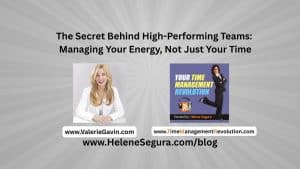The Secret Behind High-Performing Teams: Manage Your Energy, Not Just Your Time

Valerie Gavin held leadership positions in the hospitality industry through major crises like hurricanes and pandemics. Through these intense moments, as well as everyday goings-on in the office, she honed her skills to help employees work as high-performing teams even when the world around them was in chaos. Time management is involved, but not necessarily in the way you might think. You can watch our interview by clicking on the graphic below or read the highlights beneath it:
Valerie Gavin shared her knowledge about high-performing teams:
Q: What’s a high performing team?
*strong level of trust and psychological safety is the foundation
*shared purpose with aligned goals
*everyone knows how and what they’re doing contributes
*open communication to ask for help when you need it or ask to regroup
*self-awareness and team-awareness to understand how to leverage each other’s strengths and how to help each other perform better
Q: How is time management related?
*It really is critical – things that you’re trying to achieve, deadlines you need to adhere to, clients you need to work with. Time is of the essence.
*But sometimes we focus so much on time, time, time, time, time, that everything else falls by the wayside. And you leave this wake of destruction behind you. So, there’s more to it than just time.
Q: What is the Leadership Energy Code?
*It’s how can you go from just focusing on time and being so tunnel-visioned on that to actually stepping back and figuring out how to be more productive with your time? For example, how to plan your day when you’re going to be the most productive, how to manage all the distractions.
Q: “Time management is meaningless without energy management.” Can you explain what you mean by that and how leaders can start aligning their energy with their priorities?
*Most people think that they need more time. What happens when you’re just so focused on time and getting things done is that you’re not being strategic with how you’re doing it or when you’re doing it, and then you end up just reacting to whatever’s coming at you all day long. You’re like an open door. You’re handling everything that’s coming at you, and then you try to sit down and start your work at six o’clock at night when you’re already exhausted, depleted.
*You’re not able to actually give it the attention that it needs. Then you’re trying to do things when you’re tired. You’re not even really seeing the possibilities, and everything takes you twice as long when you’re exhausted. So, it’s really about understanding, what are your natural cycles and when can you schedule things to be the most productive?
Q: While time is important, calendars are important, task apps are important, they’re not the most important things. It’s managing everything else that’s happening inside of us. So, when you talk about the rhythms, are you talking about circadian rhythms? Are you talking about paying attention to your brain energy?
*Both. We all have our own natural rhythms, and we have our own times when we naturally are more productive. For the majority of us, we tend to peak in the morning with our energy. We dip in the afternoon, and then we get kind of a second wind late afternoon or early evening.
*If you can actually track that for yourself, just notice when your energy level feels great, when you feel like you’re on fire, when things are happening easily, and track that, then you can start to plan your day and your time management according to when you’re going to be the most productive.
Q: You’ve led teams through mergers as well as major crises like pandemics and hurricanes. What did those high-pressure experiences teach you about managing your time and mind under extreme stress?
*You have to step back and look at the CIA method. What can I Control? Take care of that. What can I Influence? Can I negotiate that? And then the A is, what can I either adapt or accept?
Q: When you talk about helping leaders or executives achieve clarity, what is it that we need to have clarity on?
*What you need the clarity on is who you are, what’s important to you. If you’re not clear on that, then it’s easier to get caught up in whatever’s happening. If you are really clear on who you are, it makes all the other decisions so much easier to make.
Q: Can you give a few tactical examples of a few simple daily practices that we can use to shift from being in a reactive mode to more intentional, focused mode, whether we’re in leadership or not?
*The foundation of really everything is building good habits to support you. And the easiest way to do that is to start with your morning. The morning is golden. It sets your mind, your energy, everything, so that you’re better able to handle whatever comes at you. That to me is probably the most critical thing that you can do to set yourself up for success.
*Where possible, if you can not turn on any devices, not look at the TV, not look at your phone for at least an hour, just do that while you’re getting ready.
Q: Have you ever had a client say, “There is no way I can go for an hour in the morning without checking my phone“? How do you help them past that?
*I work with a lot of people in the hotel industry, so imagine if I’m dealing with a general manager of a hotel, they can’t not look at their phone the second they wake up. But they can look at it really quick, make sure there’s no emergency, and if there’s not, put it down.
Q: What about any other example of a client who has said, “I’m having a hard time tracking my energy. I don’t know when my energy is high, or my energy is low.” So, if you have a client who’s struggling with that kind of tracking, what kind of tips do you give them to help them with that tracking?
*What I’ve found in almost every case is that they’re so depleted that their energy is always low. But there are some people who have a hard time even understanding how they’re feeling. And that’s because they’ve ignored it for their whole life. They haven’t really been in tune with what that feeling is.
For the rest of her answer, as well as details about the questions above, be sure to listen to or watch the entire interview!
Connect with Valerie Gavin:
Website https://www.orionscompass.com/ or https://valeriegavin.com/
LinkedIn https://www.linkedin.com/in/valerie-gavin/
YouTube https://www.youtube.com/@ThePowerofHospitality
About Valerie Gavin:
Valerie Gavin is an Executive Coach, Speaker, and Founder of Orion’s Compass, specializing in helping leaders turn overwhelm into clarity, focus, and sustainable results. With over 25 years as a senior executive in global luxury hospitality, she has led high-performing teams through disruption, transformation, and growth. Creator of The Leadership Energy Code, Valerie delivers practical, battle-tested strategies for managing time, mind, and energy—so high achievers can excel without sacrificing well-being, relationships, or purpose.
For other Time Management Revolution podcast episodes, visit:
…or wherever you get your podcasts!
For more recommendations on how to improve your energy management and time management skills, check out The Inefficiency Assassin: Time Management Tactics for Working Smarter, Not Longer.


